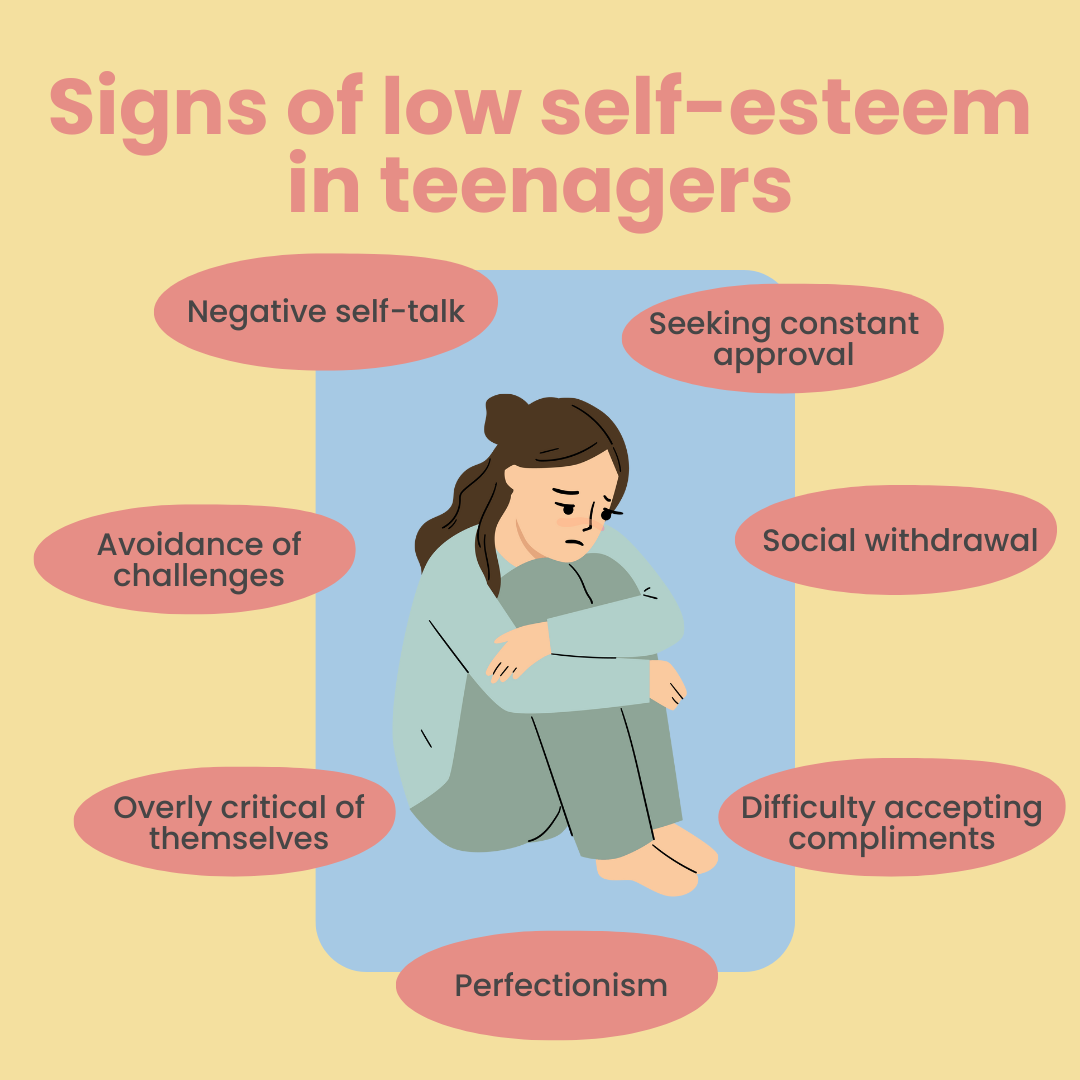
Teenage low self-esteem: causes, signs, and solutions
Is your teen lacking confidence?

Quick summary
- Teens who are struggling with low self-esteem may engage in negative self-talk, avoid challenges, seek constant approval, withdraw socially, or struggle with perfectionism and self-criticism
- Teenage low self-esteem can be influenced by unrealistic beauty standards and social comparisons online, peer pressure, academic and social dynamics at school, the impact of social media, and insecurity
- To support your teen, foster open communication, offer positive reinforcement, model self-compassion, encourage healthy risk-taking, and promote self-care habits

As a parent, understanding and supporting your child's emotional and psychological wellbeing can be challenging, especially with the emotional rollercoaster that puberty can trigger.
A big part of this is recognising signs of low self-esteem and self-confidence struggles, which we’ve learned are very common in luna’s teen community, and so we want to give you some advice on how to spot the signs and how best to support them.
Understanding the causes of teenage low self-esteem
Self-esteem refers to how someone feels about themself.
For example, having good self-esteem is about having a positive view of oneself and feeling worthy of respect and happiness.
As an adult, you’ve probably experienced low self-esteem first-hand at some point in your life too.
And knowing how bitter that experience is, you might be wondering what’s causing the same struggles in your teen.
Well, given what our teens...
- see on the internet, where unrealistic beauty standards and social comparisons dominate
- hear from their friends and peers, often leading to pressure to fit in
- experience in school, where academic performance, social dynamics can lead to low self-esteem
- face on social media, where likes and comments can become measures of self-worth
- go through during adolescence, a time of rapid physical and emotional changes
It’s not their fault if they struggle with self-esteem.
However, as parents, it can be helpful to understand them better and support them to build confidence, resilience, and a healthy sense of self-worth.
Teenage low self-esteem statistics in the UK
- 61% of girls aged 10-17 in the UK have low self-esteem
- 52% of UK youth feel satisfied with their health
- 35% of UK teens have skipped meals due to concerns about their body image
- 37% of adolescents in the UK feel upset or ashamed of their body image
Signs of low self-esteem in teenagers
To be able to be there for your teen, it's a good idea to be familiar with the signs of low self-esteem in teenagers.
Since we all know this can be tricky, here are some signs of low self-esteem in teens that you should watch out for.

- Negative self-talk: a teen may frequently put themselves down, criticising their appearance, abilities, or worth – phrases like "I'm not good enough" or "I can't do anything right" are red flags
- Avoidance of challenges: teens may often shy away from new experiences or challenges due to a lack of belief in their abilities – this can stem from a fear of failure or rejection
- Overly critical of themselves: whilst self-criticism is important for personal growth, those with poor self-esteem may be excessively harsh on themselves, unable to acknowledge their strengths and achievements
- Seeking constant approval: a teen may constantly seek validation and approval from others, relying heavily on outside opinions to feel good about themselves
- Social withdrawal: a teen may withdraw from social activities or friendships/relationships, possibly stemming from feeling unworthy of others' attention or fear of being judged
- Perfectionism: while striving for high standards is not an inherently negative trait, extreme perfectionism may signal poor self-confidence – teens might feel that they need to be perfect to be accepted or valued
- Difficulty accepting compliments: a teen might struggle to accept compliments, often dismissing or downplaying them, possibly rooted in an internal belief that they are not deserving of praise
How to help a teenager with low self-esteem
Building self-assurance and fostering self-compassion in your teen to boost their low self-esteem involves creating a supportive and nurturing environment.
Some ways to help include:
- Open communication: create a safe space for your teen to express their thoughts and feelings. Listen actively and empathetically without judgement – we've also got a guide for talking to your teen about their mental health if you need
- Positive reinforcement: highlight and celebrate your teen's strengths and achievements. Offer genuine praise and encourage them to recognise their worth – if they're struggling with body image in particular, luna's got a guide on boosting your teen's body image
- Model self-compassion: show your teen what self-compassion looks like by treating yourself kindly and forgiving your own mistakes, alongside encouraging others in the household to behave the same way – this sets a powerful example for your teen to follow
- Encourage healthy risk-taking: support your teen in trying new things and stepping out of their comfort zone – this may even involve accompanying them on certain experiences that may be especially nerve-racking for them; celebrate their efforts and resilience, regardless of the outcome
- Teach self-care: encourage habits that promote physical and mental wellbeing, such as regular exercise, adequate sleep, and mindfulness practices
- Seek help: if your child is really struggling even with the advice above, it may be worth speaking to them about getting professional help; professional mental health support can build your child’s psychological resilience and tackle their issues head on in an effective manner – you can speak to a GP about this in the first instance, and they may refer you elsewhere or offer advice themselves
Some of the core foundations of self-esteem are formed in the teenage years.
By being attentive to the signs of low self-esteem and taking proactive steps to nurture your teen’s self-assurance, you can help them develop a strong and healthy sense of identity.
Remember, your support and understanding play a crucial role in your teen’s journey towards becoming a confident and resilient young adult.
How can luna help to boost teens' self-esteem
A sense of belonging can help to restore your teens' self-esteem by providing support and connection.
And that's where luna comes in.
luna helps teens by offering a safe space to ask questions, learn from medical experts, and more.
We're helping teens by:
- Providing resources on body image, mental health, and confidence-building
- Offering a safe space to ask personal health and wellbeing questions
- Assisting teens to develop self-awareness through tracking tools
- Equipping parents with insights to support their teen’s self-esteem via a newsletter
- Building a sense of belonging and connection through a supportive community

How we created this article:
luna's team of experts comprises GPs, Dermatologists, Safeguarding Leads and Junior Doctors as well as Medical Students with specialised interests in paediatric care, mental health and gynaecology. All articles are created by experts, and reviewed by a member of luna's senior review team.
Sources:
NHS "Raising low self-esteem" | Accessed 19.03.25
https://www.nhs.uk/mental-health/self-help/tips-and-support/raise-low-self-esteem/CAMHS "Low self Esteem" Accessed 19.03.25
https://www.camhsnorthderbyshire.nhs.uk/low-self-esteemFind out about trends when your teen does
Sign up to our parent newsletter for emails on the latest teen trends, insights into our luna community and to keep up to date
By signing up, you are agreeing that we can use your email address to market to you. You can unsubscribe from marketing emails at any time by using the link in our emails. For more information, please review our privacy statement.